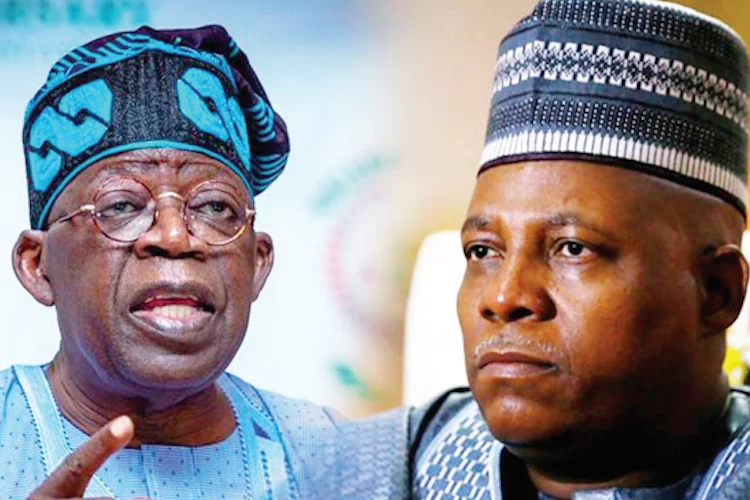Since the presidential candidate of the ruling All Progressives Congress (APC), Asiwaju Bola Ahmed Tinubu, announced Senator Kashim Shettima as his running mate in next year’s presidential election, there has been vociferous vituperations against the decision from within the party and outside. This is just as there has been stout defence of the choice by the party and a section of the supporters. All the ruckus it kicked up is primarily because both Tinubu and Shettima are of the Muslim faith.
In explaining his reason for choosing the former Borno State governor, Tinubu said it was based on competence and track record, and that he wanted a deputy who could help him execute his mission of turning around the country’s fortunes and on that basis, Shettima was fit for purpose.
No sooner had Tinubu announced his choice than a cacophony of voices rang out to condemn his decision to have two Muslims on the APC presidential ticket in a country divided straight down the middle between two regions – North and South – and two religions – Christianity and Islam.
Northern Christians, both as individuals and as groups, rose in unison to berate Tinubu for, in their view, showing insensitivity and neglect for Christians in the North, from where he was obliged to choose his deputy.
Former secretary to the government of the federation (SGF) Babachir Lawal led other prominent individuals to reject Tinubu’s choice of a Muslim while the Christian Association of Nigeria (CAN) and Catholic Bishops Conference of Nigeria (CBCN) led the rejections for other groups. They all pointed out that same-faith presidential ticket did not respect the country’s diversity and its federal character principle. On the matter of competence Tinubu cited for his decision, they argued that it was a fallacy for him to insinuate that competent hands could not be found among the Christian fold in the 19 Northern states and Abuja. In fact, some of the opposers told Tinubu to take advantage of the remaining period for the submission of names of running mates to replace Shettima with a Northern Christian, while other very aggrieved party members announced their separation from the party.
In fact, that there would be opposition to a Muslim-Muslim ticket was anticipated. Even before Tinubu made his choice, several voices had warned against such a move. It is because of this that Tinubu took five weeks after winning the presidential primary before announcing his choice.
As a newspaper, we wish to state that it is the prerogative of a presidential candidate, whether Tinubu or any other person, to choose his running mate. And in making this decision, he must carefully weigh all the options that could help him not only to win the presidential election but also to govern the country in the event that he wins. The recent comments credited to former President Olusegun Obasanjo that he made the wrong choice of a vice president in 1999 underscores the need for the presidential candidate to select a deputy he can work harmoniously with to deliver on his mandate if he eventually wins the election to avoid the cat-and-mouse relationship Obasanjo had with Atiku Abubakar.
That Tinubu also needed to consider the religious balancing act – which every naysayer has been underlining – is a valid argument as well. However, his reference to the June 1993 experience of Muslim-Muslim ticket when MKO Abiola and Babagana Kingibe ran for the presidency in the aborted Third Republic without any complaints from any quarters does not apply: Nigeria of 30 years ago is significantly different from today’s Nigeria which is deeply divided along regional and religious lines, a situation that is not helped by the rapaciously murderous Islamic extremists and terrorists waging a bloody war against the Nigerian state, with a mission to enthrone radical Islam on Nigerians. The shoddy execution of the war against Boko Haram, ISWAP and Ansaru Islamic terrorists and the failure of the present administration to rein in rogue herdsmen and bandits across Nigeria, in addition to skewed appointments into sensitive positions by President Muhammadu Buhari in favour of one religion have fuelled fears of Christians, especially in the North, of an Islamisation agenda. These divisions were not there in the Abiola/Kingibe time.
What many have rationalised as Tinubu’s true reason is that he is sacrificing national cohesion on the altar of political expediency – that he feels he stands a better chance of winning the election with a Muslim deputy from the North as against a Christian. And just like the main opposition Peoples Democratic Party (PDP) had argued – on abandoning its zoning principle – that it was paramount to win power before sharing it, Tinubu’s first duty to himself and his party is to win the election. On that score, those berating him should cut him some slack. This is Tinubu’s election to win or lose and the outcome of the February presidential poll will decide whether this was a political miscalculation or not.
Even so, for the electorate, they have no need to lose sleep if religious balancing is an issue for them. They have other options on the ballot in the four leading parties: Muslim-Christian tickets in the PDP and New Nigeria Peoples Party (NNPP), and a Christian-Muslim ticket in the Labour Party. It doesn’t have to be APC.





